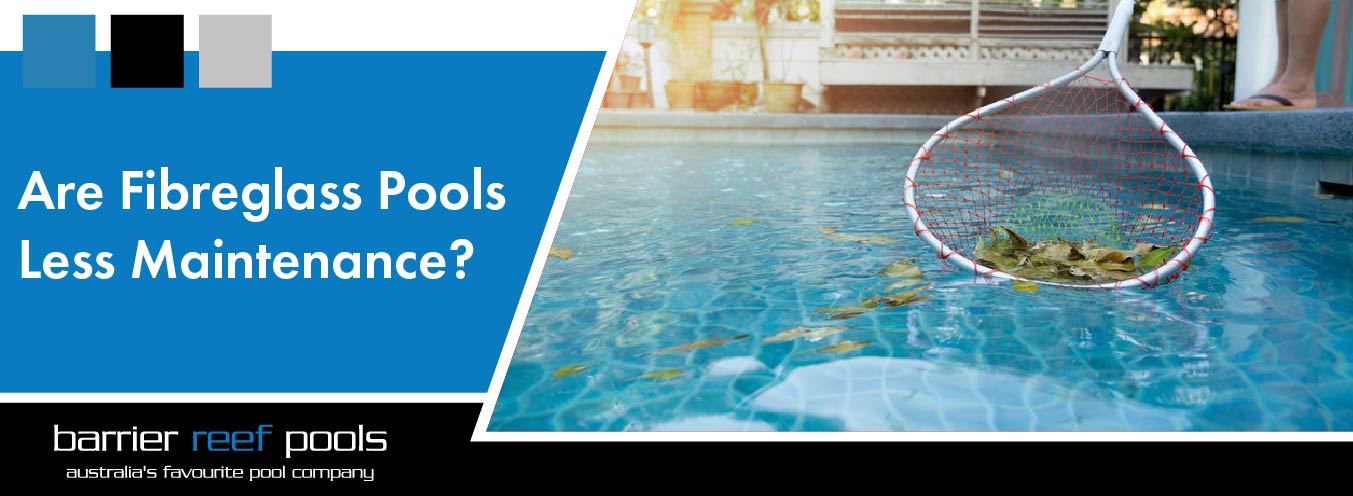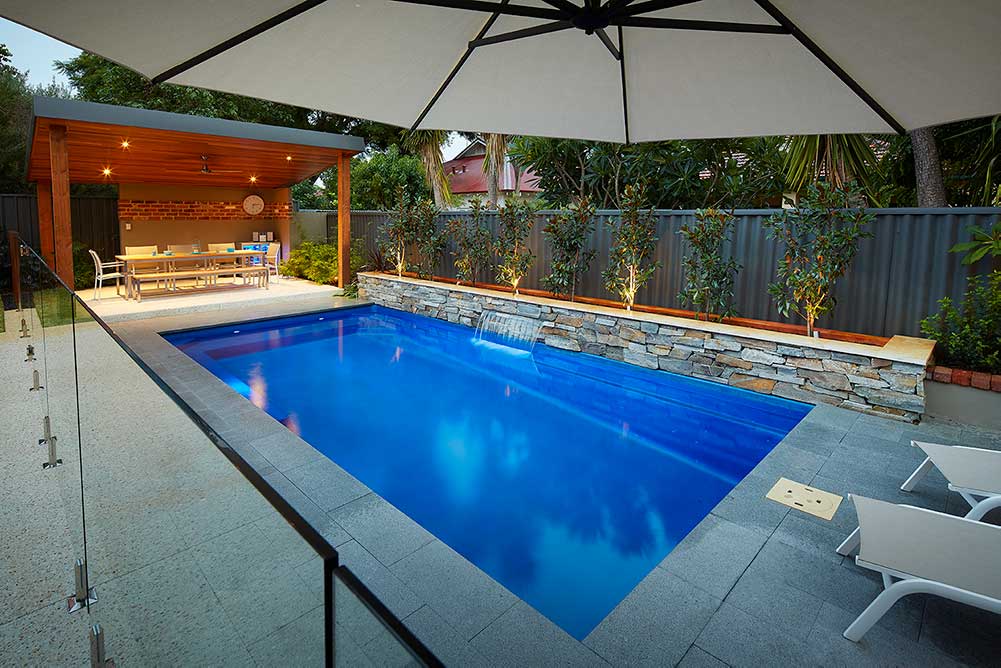Are Fiberglass Pools Less Maintenance?
Fibreglass pools absolutely require less maintenance! In fact, fibreglass pools have the lowest running maintenance cost (in terms of time, effort and money) of any pool on the market! Their maintenance requirements are typically compared with concrete pools and vinyl pools, the most popular alternatives on the market.
But why do fibreglass pools require so much less maintenance? And what exactly do they not have to do that concrete and vinyl do? Well, the naturally durable and flexible nature of fibreglass provides the majority of benefits; once the fibreglass shell is manufactured, its structure is set for a very long time (up to 30 years.) So, why are fibreglass pools less maintenance? Here’s our extensive list on why:

Fibreglass Pools Do Not Require Lining Replacement
Although vinyl pools are appealing because of their affordability, many pool owners find that the expensive upkeep and maintenance costs of vinyl more than offsets the initial price. One of the standout costs for vinyl pools is replacing the vinyl lining. This lining will need to be replaced as soon as 12 years in some cases. This replacement process is time-consuming and costly to your wallet. Worse, it will take your pool out of action for a period of time and it’s frustrating to have work done on your pool.
Fibreglass pools do not suffer from this same requirement. Fibreglass does not require lining and in most cases will need no ongoing structural repairs or maintenance once it’s installed.
Forget Metal Brushes!
Ever heard of using a metal brush to scrub your pool clean? If you’re looking at installing a fibreglass pool, then your answer will probably be no. This is because concrete pools are extremely porous; meaning algae flocks to them in droves. In order to stop serious health hazards, concrete pool owners are required to scrub away the algae with a metal brush to dissolve it. Thankfully, this is not an issue for fibreglass pool owners. No need to spend your weekends scrubbing away at your pool surface with a fibreglass pool!
Highly Algae Resistant
Speaking of algae, you might be asking why fibreglass pool owners don’t have to scrub away algae while concrete owners do. The answer is simple: fibreglass is non-porous, meaning algae has fewer places to latch onto. Fibreglass pools are also naturally more resistant to algae because of their smooth surface and gel coat technology provided by Barrier Reef Pools.
This not only means you can spend less time scrubbing your pool, you likely won’t even need a scrubber in the first place! Additionally, the less prone to algae the pool is, the less you will have to spend on regular chemicals to prevent algae growth. Save on costly solutions to algae because fibreglass is already amazing at preventing it!

No Costly Acid Washing Required
Another reason fibreglass pools are less maintenance when compared with concrete pools is that they do not need acid washing every 5 years. Acid washing is a regular process that concrete pools require in order to sanitise the surface of the pool. This process involves draining the entire pool first, in order to be safe. Acid washing is necessary; but costly, time-ineffective and can be frustrating to do every 5 years.
No Need To Resurface
Fibreglass pools also do not need to be resurfaced as concrete pools do. Resurfacing is an absolute necessity for concrete pools every 10 years. If they are not resurfaced, then the inner structure of the pool could be exposed by weather and corrosive elements, leading to unevenness in the pool surface, algae deep into the structure and water leakage. Sound scary enough for you? This process can cost up to $4500 as well.
Fibreglass pools require significantly less maintenance than other pools on the market precisely because they do not need to be resurfaced every 10 years. Fibreglass (especially when it is fitted with Barrier Reef Pool’s cutting edge resin and gel coat technology) is far more resistant to corrosion, wear and tear than concrete.
…A fibreglass pool’s surface does not affect your pool’s Ph levels as adversely as concrete does. Meaning you can spend less on chemicals…
Fibreglass Does Not Affect PH Levels Like Concrete Does
If you didn’t know, then it may come as a surprise to you that concrete actually affects the Ph levels in pool water. What does this have to do with fibreglass pools having incredibly low maintenance? Well, fibreglass pools will actually use fewer chemicals (chlorine, salt, minerals) to clean it’s pool water simply because the Ph level will not be so out of balance.
Concrete pools on the other hand will require more chemicals to re-balance their water’s Ph levels. This will also be a recurring theme over an extended period of time: the pool water will be balanced by chlorine and other chemicals, only for the Ph levels to be again unbalanced by the concrete surface of the pool. Fibreglass pools, however, won’t have such fluctuating Ph levels. In fact, if proper maintenance levels are maintained, then you will be able to establish a set routine that will cost less money and time on your end.
Fibreglass Pools Retain Heat For Longer
So, fibreglass pools retain heat for longer periods of time and they heat up faster than other types of pools – how does this relate to less maintenance?
Because fibreglass pools retain heat for longer and faster, this means you won’t have to keep your pool’s heater running as long as you normally would. Combine this with a pool cover during the colder months and you’ve got yourself not only a better swimming experience but less costly electricity bills too.
As you can well see, fibreglass pools require less maintenance overall than any other pool type. This not only includes maintenance costs in terms of money but also in time and effort spent cleaning and maintaining it. So, if you’re looking for a pool with maximum fun and minimum upkeep, then fill out Barrier Reef Pool’s online, free quote form today!
